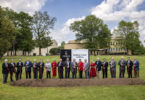UGA is undertaking a large-scale effort to streamline and enhance the way that grants for research and other sponsored projects are managed, with the ultimate goal of boosting faculty productivity.
“I have heard repeatedly from faculty that pre- and post-grant support services must be improved to ensure that faculty are able to focus on their research,” said Pamela Whitten, senior vice president for academic affairs and provost. “That message has been heard loud and clear, which is why multiple units are working together to improve the way that we manage grants here at UGA.”
Shortly after Whitten took office earlier this year, she charged a nine-member team of deans—chaired by Donald Leo in the College of Engineering and Phillip Williams in the College of Public Health—with creating a strategic plan for significantly enhancing the research enterprise at UGA. In April, she hosted the inaugural LEAD meeting, which brought more than 130 school and college faculty leaders and other administrators together to gather input on ways to improve UGA’s research productivity.
Separately, a 14-member work group on research administration composed of faculty and grants administrators began meeting in fall 2013. In March 2014, the group submitted recommendations for improving customer service among grants administrators, providing consistent levels of service across campus and enhancing
communication.
“Nearly 250 people—including VPs, deans, department heads, directors, faculty and staff—have devoted countless hours toward this initiative,” Whitten said. “Thanks to their dedication, we have laid the groundwork for significant improvements.”
A consistent refrain from faculty has been the need for functional integration of pre-award services provided by the Office for Sponsored Programs—a unit of the Office of the Vice President for Research—and post-award services provided by Contracts and Grants, a unit of the Division of Finance and Administration.
“We have committed, hard working staffs in the pre- and post-award units, and elsewhere in research administration,” said David Lee, vice president for research. “We want to make it easier for them to offer the best possible service, which is certainly what they wish to provide and surely what our world-class researchers deserve.”
Earlier this semester, the staffs from the two offices increased the frequency of their regular meetings to improve coordination, and a shadowing program between the two units is scheduled to be launched next semester.
Plans are being made to house the two units in the same building beginning spring 2015, and they have increased their outreach to departments through presentations that update faculty on new regulations and other issues.
In addition, staff members in the pre- and post-award units are working with other grants administrators from across campus to modify and improve business processes. Several process changes already have been implemented, and work groups are addressing additional opportunities for improvement.
Several steps are being taken to improve customer service in grants administration. A new training program will be implemented later this semester, and feedback buttons are being added to websites and to the email signatures of Contracts and Grants staff. The OVPR website has been redesigned to enhance communication, and Contracts and Grants is redesigning its website.
The university is considering additional changes as well. The Huron Consulting Group, which has worked with more than 350 universities and research institutions nationwide, is conducting an independent review of the administrative operations that support research and other sponsored activities at UGA.
Huron’s work has included interviews with faculty and staff, assessments of organizational structure and benchmarking against aspirational institutions. In December, the consulting group will present a report that will provide recommendations and an implementation plan.
Ryan Nesbit, vice president for finance and administration, emphasized that the review of research support functions has been a collective undertaking among faculty, staff and administrators.
“As we move through this process, I am very appreciative of how our teams continue to demonstrate their dedication to service excellence,” he said. “We look forward to receiving Huron’s recommendations and suggestions for how we can all work together even more to implement additional, transformational improvements.”
Whitten noted that the improvements in grants management are part of a broader “Giant Step” initiative to advance research at UGA.
“We have some of some of the world’s best researchers and scholars on our campuses,” she said. “By enabling them to devote more time to research—and less to research administration—we’re creating an environment that allows faculty to maximize their productivity and scholarly impact.”







